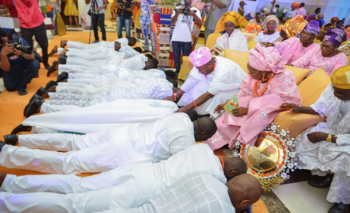Richness in Culture and Diversity: The Symbolic Naming Ceremony of the Yoruba People.
What
do you know about the Yoruba people? A group of people with unique peculiarities
and an interesting way of life. The Yoruba people make up one of the three
largest ethnic groups in Nigeria and occupy the southwest region of the country.
They are acclaimed to be of Oduduwa descent. They are people of rich cultural
heritage who pride themselves in their organized, structural, and systemic existence,
and their deep reverence for their culture, the elderly, kingship, and divinity.
They are very intelligent, largely accommodating, and very peaceful.
They are also very religious
people with a deep-rooted reverence for their hierarchical deities although
today so many of them are Christians and Muslims. Their culture of deep reverential
worship and honour is still very much evident no matter the worship method they
practice.
They are majorly farmers, weavers, blacksmiths, wood
carvers, and craftsmen.
They are a people given to folklore, songs, dances, symbols, myths,
and proverbs which are filled with insightful meaning and associated with so
many ceremonies.
Rich Yoruba Cultural Dance
It is one of those important and symbolic ceremonies that this post is about.
I recently learned something quite interesting about the Yoruba
naming ceremony. One might be tempted to
argue about the relevance of the practice or refute the idea that it has any significant
bearing on the life of the child, however, I want to state that the purpose of
this post is not to argue about the people’s cultural beliefs and heritage but to
showcase a practice I find quite interesting and I dare say beautiful.
The Yoruba people are big on naming ceremonies (Christening)
of their newborns. They believe so much in “The Naming” of a child because they
believe that the name of a child has a significant bearing on the outcome of
the child’s existence, which is why they choose well-thought-out names for the
newborn and the ceremony is conducted on the 7th day. According to
their culture, the name a child bears is the child’s identity.
The ceremony usually has close family members and friends in
attendance and is presided over by either an Ifa Priest, an elder in the
family, a pastor, or an imam, depending on the religious faith or preference of
the child’s parents.
Some symbolic items are presented on the day of the naming. Before
now these items are placed on the tongue of the child but in recent times, for
health reasons, they are placed on the tongue of the mother who receives them
for her child. Family members (Grandparents, Parents, Uncles, and aunts) and
distinguished guests each lift the items and make a symbolic pronouncement that
is associated with the items on the child. Let’s look at the items presented.
1.
Honey (Oyin)/ Sugar: Honey is generally regarded as a
sweetener which symbolizes that the child will experience a sweet life.
Honey Sugar
2.
Kolanut (Obi): A portion of the Kolanut is
bitten off, chewed, and spat out. This act symbolizes that just as the kola nut
is chewed and spat away, no evil or bitterness will ever find its way into the
child’s life.
Kola nut
3. Pepper (Ata): The red habanero pepper contains a lot of seeds within it so its presentation symbolizes that the child will lead a fruitful life and have many offspring.
Habanero Pepper
4.
Dried fish (Eja): The fish lives in its natural
environment which is the water and no matter how turbulent the water gets, the
fish is always able to navigate its way through the water and survive. This symbolizes
that the child will never be overcome or overwhelmed by life challenges but he will
remain victorious.
Dried Catfish
5.
Salt (Iyo): Salt is used to flavor food to make
it tasty. It also serves as a preservative of valuable food items. The
symbolism of presenting salt in the naming of the child is that the child’s
life will be full of beautiful flavor and the child will be a preserver of
important and valuable things.
Salt
6.
Water (Omi): water has no enemy as it is needed
by everyone for survival. The symbolism is that just as water has no enemy, the
child will not have enemies and his growth and prosperity in life will not be
hindered.
Water
7.
Palm Oil (Epo): Palm Oil is presented because generally
it is used as a lubricant and also to smoothen the body. This symbolizes that
the child will have a smooth and easy life free of crisis.
Palm Oil
8. Bitter Kola (Orogbo): Bitter Kola has the property of being long-lasting and for the child, it symbolizes that the child will have a long flourishing life.
Bitter Kola
When all these have been presented, then the child is prayed for and the merriment begins. There is usually so much to eat and drink and then the partying, singing and dancing kick off in full swing.
Did you find this information interesting
like I did? Please drop a comment and share some other cultural ceremonies associated with children that the Yoruba people practice. You can also share those of other
ethnicities, I will love to hear from you.
















No comments:
Post a Comment